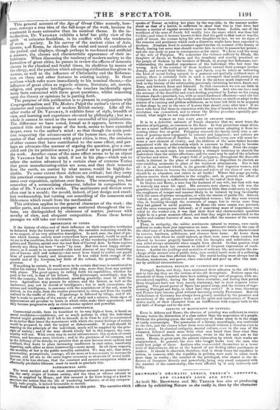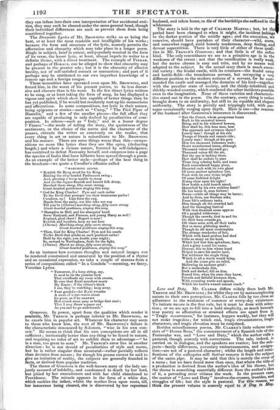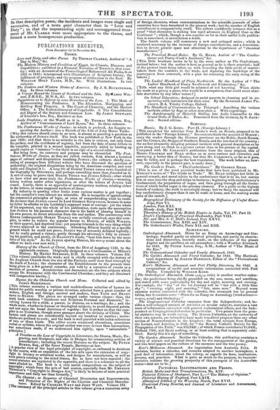BROWNING'S DRAMATIC LYRICS, TRENCH'S GRNOVEVA, AND CLARKE'S LOVE AND DUTY.
As both Mr. BROWNING and Mr. TRENCH less aim at producing effects by exhibiting Nature as she really is, than by the character
they can infuse into their own interpretation of her accidental enti- ties, they may each be classed under the same general head, though their individual differences are such as prevent them from being considered together.
The Dramatic Lyrics of Mr. BROWNING strike us as being the best, or at least the most readable and intelligible of his works ; because the form and structure of the lyric, scarcely permits the affectation and obscurity which may take place in a longer poem. Single in subject, brief in extent, and popularly musical in the form of its verse, the lesser lyric, at least, almost impels its writer to a definite theme, with a direct treatment. The example of PINDAR, and perhaps of HORACE, can be alleged to show that obscurity may be present in the greater ode ; but it is the obscurity of allusive brevity, not of self-satisfied conceit or mannerism ; and part of it perhaps may be attributed to our own imperfect knowledge of a remote age and a foreign tongue.
These necessities have operated even upon Mr. BROWNING, and forced him, in the worst of his present poems, to be less discur- sive and obscure than is his wont. In the few direct lyrics written to be sung, or at least taking the form of song, he has displayed a vigour and spirit which show him capable of better things than he has yet published, if he would but resolutely root up his mannerisms and affectations. In some compositions, not lyric in their nature, being epigrams or stories—such as "Camp," "The Pied Piper of Hamelin," and a few of the smaller pieces—the full effect they are capable of producing is only dashed by peculiarities of com- position. In others—such as " Italy," and in a lesser degree
France "—the mode of telling the story, the quaintness of the sentiments, or the choice of the metre and the character of the pauses, obtrude the writer so constantly on the reader, that every thing in art or nature is subordinate to Mr. BROWNING and his manner. There are some things worse than this—compo- sitions no more like lyrics than they are like epics, (deducting length,) and where a vicious nature, fostered by self-indulgence, has contrived to defeat Necessity herself, and compress into a page the species of faults that have hitherto beets spread through a poem. As an example of the better style—perhaps of the best thing in the brochure—we quote a Cavalier's effusion called
"MARCHING ALONG.
" Kentish Sir Bing stood for his King, Bidding the crop-headed Parliament swing ; And, pressing a troop unable to stoop And see the rogues flourish and honest folk droop, Marched them along, fifty-score strong, Great-hearted gentlemen singing this song.
" God for King Charles ! Pym and such caries To the Devil that prompts 'em their treasonous parks Cavaliers, up I Lips from the cup, Hands from the pasty, nor bite take nor sup Till you're (Chorus) marching along, fifty-score strong Great-hearted gentlemen, singing this song.
"Hampden to Hell, and his obsequies' knell
Serve Rudyard, and Fiennes, and young Harry as well f
England, good cheer! Rupert is near!
Kentish and loyalists, keep we not here (Chorus) Marching along, fifty-score strong Great-hearted gentlemen singing this song.
"Then, God for King Charles! Pym and his snarls To the Devil that pricks on such pestilent caries! Bold by the right, you double your might ; So, onward to Nottingham, fresh for the fight, (Chorus) March we along, fifty-score strong, Great-hearted gentlemen, singing this song."
As an instance how common thoughts and natural images can be rendered constrained and unnatural by the position of a rhyme and an occasional expression, we take a couple of stanzas from a series of compositions called " In a Gondola "—meaning, we fancy, Venetian Lyrics.
" Tomorrow, if a harp-string, say, Is used to tie the jasmine back That overfloods ray room with sweets, Be sure that Zorzt somehow meets My Zanze: if the ribbon's black I use, they 're watching; keep away.
" Your gondola—let Zorzi wreathe A mesh of water-weeds about Its prow, as if he unaware Had struck some quay or bridge-foot stair; That I may throw a paper out As you and he go underneath."
Genoveva. In power, apart from the qualities which render it available, Mr. TRENCH is perhaps inferior to Mr. BROWNING, as he excels him in popular art. Whatever his character may seem to those who know him, the root of Mr. BROWNING'S failure is the characteristic denounced by Solomon, "wise in his own con- ceit." He seems to think that his own conceptions are all in all sufficient ; intrinsically better than any thing to be found in nature, and requiring no rules of art to exhibit them to advantage—" he is a man, too great to scan." Mr. TRENCH'S error lies in another direction : he is not devoid of peculiarities of style and metre, but he is rather singular than unnatural—rather partially reflects than deviates from nature ; for though his poems cannot be said to give an imitation of reality, the subjects are generally founded in facts, or derived from popular tradition. The theme of Genoveva is the well-known story of the lady un- justly accused of infidelity, and condemned to death by her lord, but pitied by her executioners and with her child abandoned to Providence. The miracle appears in the form of a white doe, which suckles the infant, whilst the mother lives upon roots, till, her innocence being cleared, she is discovered by her repentant
husband, and taken home, to die of the hardships she suffered in th wilderness.
The story is laid in the age of CHARLES MARTEL; but, let the period have been changed to when it might, the incident belongs to the darker portion of the middle ages ; and the execution, we conceive, should have partaken of their character—wild, stern, and somewhat rugged, amid homely tenderness, deep feeling, and devout superstition. There is very little of either of these quali- ties in Mr. TRENCH'S Genoveva; and that little is of the softer kind. The only resemblance we see to a primitive age is in the weakness of the verses : not that the versification is really weak, but the metre chosen is easy and trite, and by no means well adapted to the subject. In the actual story there is much essen- tial variety : the feudal castle, with its retainers—the feudal camp and battle-field—the treacherous servant, but occupying a very different position to the modern notions of a servant, for he com- manded the castle and managed the domains of his lord—together with the peculiar state of society, and the thinly-inhabited and thickly-wooded country, which rendered the other incidents possible even to the imagination. None of these varieties and characteris- tics stand out in the poem. On the contrary, every thing is rather brought down to an uniformity, but still to an equable and elegant uniformity. The story is prettily and trippingly told, with pas- sages occasionally verging upon depth. Here is one—the remorse of husband after Genoveva's innocence is discovered.
" But the Count, whom prosperous hours Back to his ancestral towers Bring, and to his widowed bowers, How shall he, this lone man, bear The approach and entrance there? Lonely man! though at his aide Troops of friends and vassals ride; Lonely man! though at his gate Him ten thousand welcomes wait ; Heart unwelcomed home, although Thousand voices skyward go; Thousand voices fill the air, But the one is lacking there.
How shall he endure to pace Those long echoing halls, and trace Each remembered happy place, flaunted each with its own ghost Of some ancient splendour lost, Each with its own vi,ion bright Of some forfeited delight Rising clear upon his sight ? How beside a cold hearth stand,
Quenched by his own reckless hand?
He has borne it, man forlorn!
Borne—while all things may be borne; And he lives, nor freedom asks, From life's ordinary tasks. Him though oft the crowded hall And the thronging festival With that dreariest sense oppress Of a peopled wilderness; Though the crowds, that to and fro On their busy errands go, Oft times seem with all their tasks Bat so many gibbering masks; Though he oft must contemplate The strange mockeries of fate, Which with hand profuse had shed Gifts so many on his head, Which had lent him splendour, fame, And a glory raund his name, Honour, due to him whose band Helped to save his native laud, Yet withdrew the single thing Which to all a worth would bring. And the years give no relief, - Mellowing an austerer grief: But a melancholy dim, Dark and darker, fell on him.
Round him, when his state they knew, Friends and faithful kinsmen drew, With consoling words and speech, Which his heart's wound cannot reach."
Love and Duty. Mr. CLARKE differs widely from both Mr. TRENCH and Mr. BROWNING ; for whilst they err by metamorphosing nature to their own perceptions, Mr. CLARKE fails by too close an adherence to the weakness of common or every-day existences. To imitate nature is the first rule, but it must be done with selec- tion; or we are apt to fall into a bald simplicity, as much beneath true poetry as affectation or strained effects are apart from it. " Tragic occurrences," for instance, happen weekly, but they will not make tragedies ; for which end, tragic circumstances, tragic characters, and tragic elevation must be conjoined. Besides miscellaneous poems, Mr. CLARKE'S little volume con- sists of " Donna Rosa," the commencement of a Spanish tale of the Peninsular war, and "Love and Duty," which the author calls a pastoral, though scarcely with correctness. The tale, indeed, is carried on in dialogue, and the speakers are rustics ; but the sub- jects—family differences, pecuniary embarrassments, and emigra- tion—are not of a pastoral character ; whilst the length and rami- fications of the colloquies still further remove it from the subject of the oaten pipe. It may be said that this is merely the error of a name ; but we have found more than once, that where the title of a production is derived from the author's idea of his theme, but the theme is something essentially different from the author's idea of it, a pervading error vitiates the work. In the present case, the matter of "Love and Duty" involves the crosses, troubles, and struggles of life ; but the style is pastoral. For this reason, we think the present volume is scarcely equal to A Day in May In that descriptive poem, the incidents and images were single and successive, and of a more quiet character than in " Love and Duty " ; so that the unpretending style and unexaggerated treat- ment of Mr. CLARKE were more appropriate to the theme, and formed a more homogeneous production.




























 Previous page
Previous page